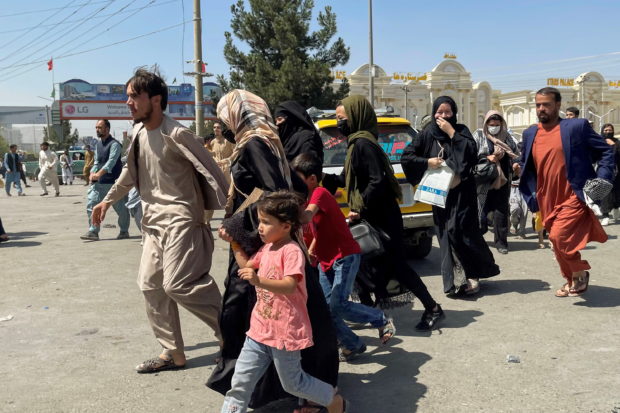‘Is there any way we can get out?’ Afghans in US struggle to help relatives in Kabul

People try to get into Hamid Karzai International Airport in Kabul, Afghanistan August 16, 2021. REUTERS
SAN FRANCISCO/FREMONT, California — As the Taliban took over Kabul on Sunday, Besmellah Khuram sat in his living room in Sacramento and video-called his family in Afghanistan.
His 34-year old brother was terrified of reprisals from the Taliban because he had worked as an IT contractor for foreign charities and the Afghan government, Khuram said. The Taliban enforced a strict version of Sharia law during its 1996-2001 rule, which included administering punishments such as public stonings, whippings and hangings.
The brother hoped that Khuram, who had worked with USAID in Afghanistan and now lives in the United States with a green card, might be able to help.
“Is there any way we can get out?” Khuram said that his brother asked him. Also staring at Khuram on the screen were his elderly mother, his brother’s wife, and their two young children.
Khuram, through tears, answered it was impossible to get them out, he recounted to Reuters.
“Then there was just silence. No words,” Khuram said.
He did not disclose his brother’s name, citing the need to protect him.
Khuram, who now works as a car salesman and is an Afghan community leader in Sacramento, wants the international community and the Biden administration in particular to do more for Afghans.
“They stood shoulder by shoulder with the Americans to achieve their mission,” he said. “Now it’s America’s time to stand shoulder by shoulder with Afghans who worked with them, who risked their lives,” said Khuram, 36.
Thousands of civilians desperate to flee Afghanistan thronged Kabul airport’s single runway on Monday after the Taliban seized the capital, prompting the United States to suspend evacuations. Some clung to a U.S. military transport plane as it taxied on the runway, according to footage posted by private Afghan broadcaster Tolo news.
Amid criticism over the chaos, President Joe Biden on Monday defended his withdrawal and blamed the Taliban’s takeover on Afghan political leaders who fled the country and the unwillingness of the U.S.-trained Afghan army to fight the military group.
Some of the roughly 156,000 Afghans living in the United States are clamoring for Washington, which invaded Afghanistan in 2001, to take in more Afghans.
“The United States has a moral obligation. Admit as many Afghan refugees as possible,” tweeted Khaled Hosseini, author of bestselling novel The Kite Runner, who lives in Northern California.
At least 60,000 Afghans live in the San Francisco Bay Area, estimated the Fremont-based Afghan Coalition’s executive director Rona Popal, likely making it the largest Afghan community in the United States.
Some came as early as the 1980s, fleeing the Soviet invasion, while others arrived recently under Special Immigration Visas granted to at-risk Afghans who worked for the U.S. government.
The Afghan Coalition is trying to help Afghans file visa requests for their relatives stuck in the country, Popal said, but there is little else the organization can do.
Jawid Amerian, 31, who runs an Afghan food import business in Fremont after arriving in the United States five years ago, said he feels helpless when he speaks to his tearful mother back home.
Amerian, originally from Herat, criticized the Biden administration’s withdrawal of U.S. troops from Afghanistan.
“The timeline was not right. I wish the Biden administration had made a better decision and had not let the country be destroyed by this extremist group,” said Amerian. “We do not know what is happening tomorrow in Afghanistan.”